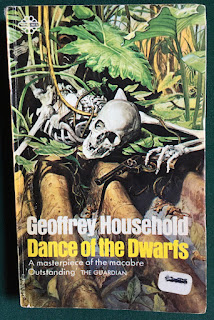The story takes place in a remote area between plains and jungle in Colombia, where an Argentine born and raised Brit, Owen Dawnay, is researching soils and planting techniques. It is truly desolate. He lives in an abandoned estancia a few hours walk from a tiny "town". The book is framed with a preface explaining how Dawnay's body was found in the estancia, presumably murdered by some leftist revolutionaries. Then later a diary is discovered, which makes up the rest of the book. It is all very well-written and the description and portrayal of the region, both the physical environment and the small world of the locals (mainly natives, itinerant cattlemen, the Spanish guy who runs the store and the aforementioned revolutionaries who show up from time to time to be intrusive and self-righteous and implicitly criticized by locals and Dawnway) are thorough and realistic. The problem is that really not much happens. There are visits and eventually he is gifted a young native girl from Bogota. This whole storyline is incredibly problematic to say the least, though also probably realistic for the time. She becomes his love and sort of daughter (she may not yet be even 15) and as the book moves on, he does fall in love with her. He treats her quite well but the whole thing is quite tough to read and exposes Household's colonial perspective in about a dark a way as possible. She is often referred to as an object and he is pleasantly and wondrously surprised when she demonstrates the smallest hint of an actual personhood. Yikes!
The other storyline is that of the "duende", supposed magical and evil dwarves that come out for humans at night. Other than Joaquin, the local shaman, nobody else will explicitly mention them. They do however refuse to travel in certain areas at night, get scared when Own tries to play the guitar and they shut all the doors and gates the estancia each night. Own gets interested and much of the second half of the book is him tracking these duende, which he discovers may be some kind of relative of the stoat, based on their hunting technique, but much larger and with a weird bouncing gate that makes them look like little dwarves. They are actually quite dangerous and stalking and hunting them puts Owen's own life at risk.
So yeah, it's a kind of cool idea and I was absorbed with the setting, but I'm still not sure what the point of it all was and I found myself having to push to get through to the end. And since I knew what was going to happen, though not precisely how, I wasn't all that interested to get there. It was sort of satisfying how it all wrapped up.






No comments:
Post a Comment